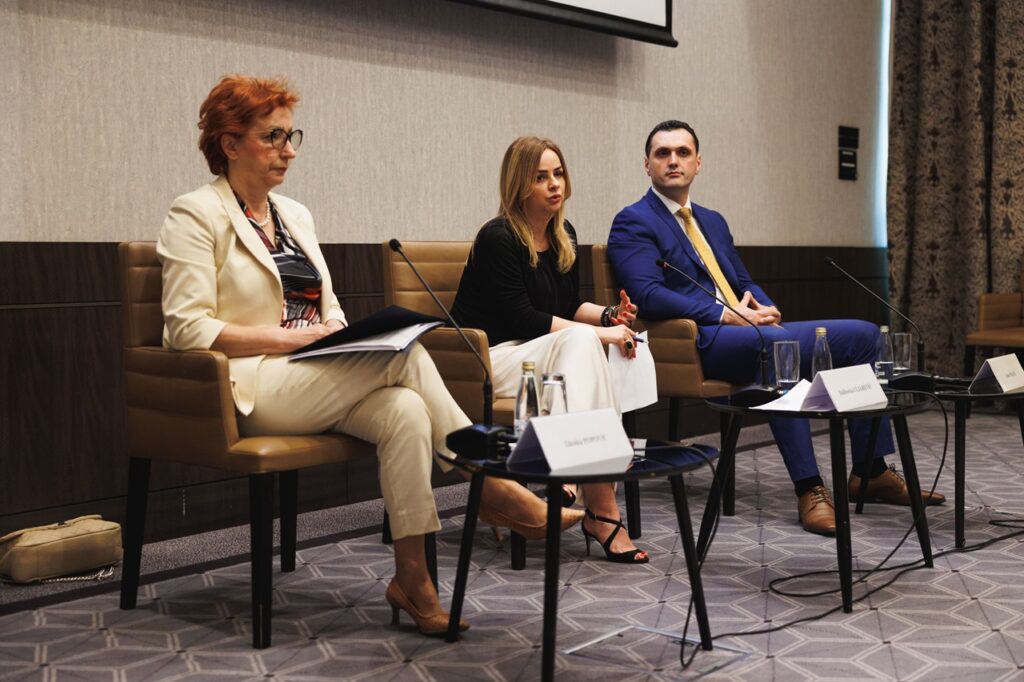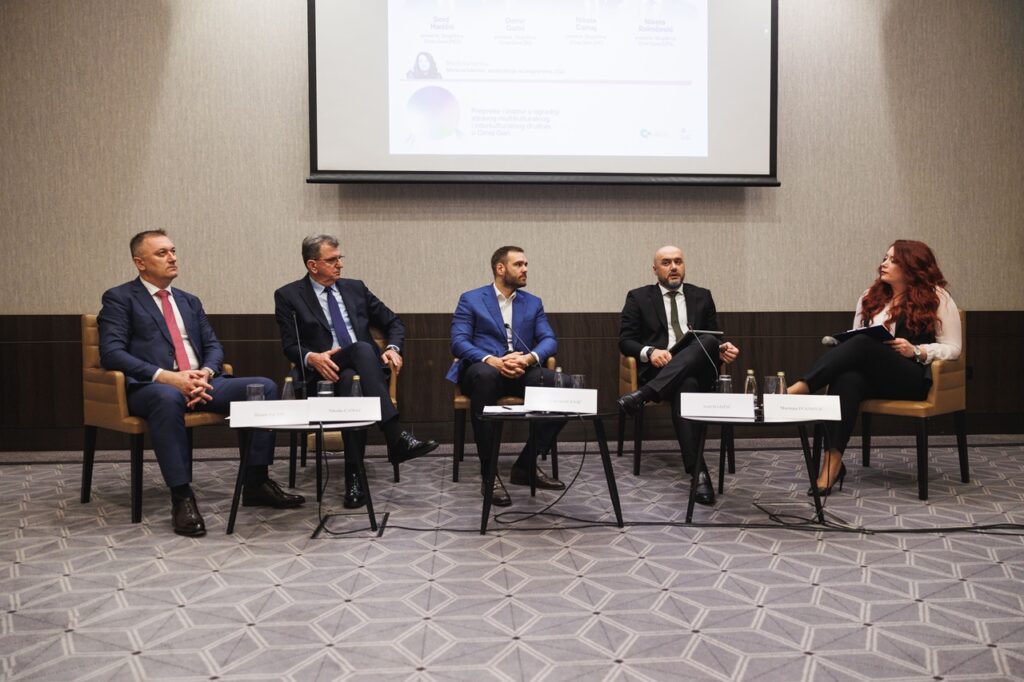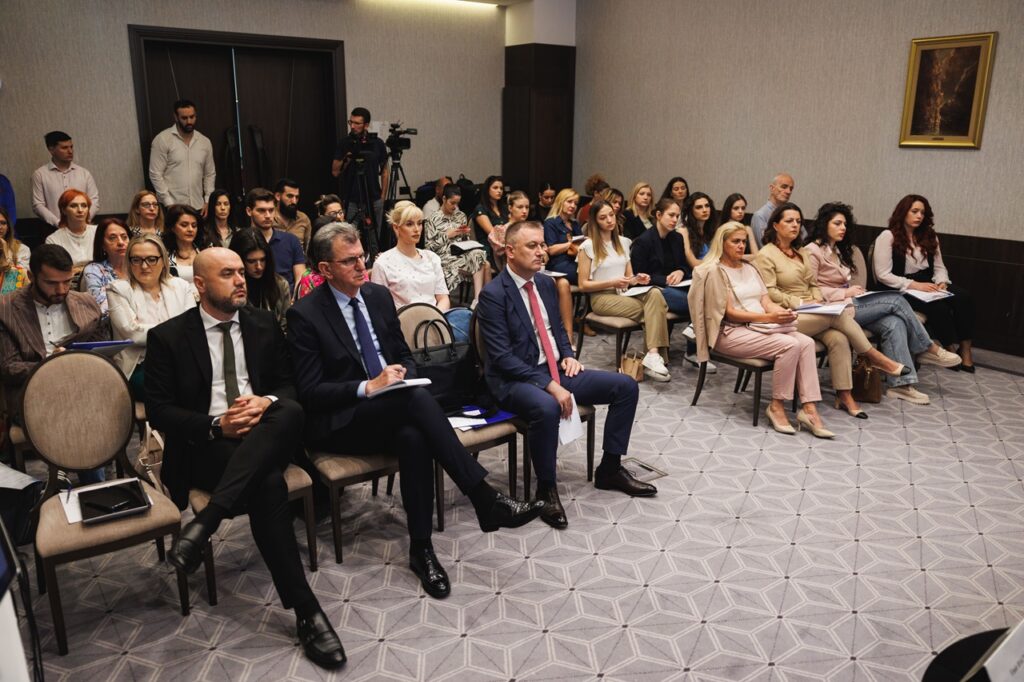“The political environment significantly contributes to the construction or deconstruction of multiculturalism and democracy. Democracy and multiculturalism rest on differences in terms of culture, social reality and politics, and all of that should be united under the umbrella of civil, decent, cultural Montenegro,” was the message from the conference “Obstacles and challenges in building a multicultural and intercultural society” organized by the Centre for Civic Education (CCE), with the support of the Fund for the Protection and Realization of Minority Rights.
Zdenka Popović, Vice President of the Parliament of Montenegro, pointed out that Montenegro represents an excellent example of how different cultures, religions and traditions can coexist and make the country richer. “However, we are faced with numerous challenges and obstacles in building a healthy multicultural and intercultural society. Among them are prejudices, stereotypes, intolerance, as well as economic and social differences that often deepen the divisions between different communities, disrupt social cohesion and slow down the integration process,” emphasizes Popović. She underscored the importance of education. “Education is the foundation of every community and society. That is why it is necessary to improve the education system in order to promote intercultural literacy, understanding and respect for diversity from an early age,” she said. Popović emphasized the role of institutions, media and civil society. “Institutions are key in promoting the rights of minority communities and ensuring full integration. The media must be responsible and promote positive examples, while NGOs can contribute through various projects that promote mutual understanding,” she stated.
Emir Dacić, director of the Fund for the Protection and Realization of Human and Minority Rights, emphasized the importance of the participation of representatives of the Assembly, which is the founder of the Fund. “The fund was established with the aim of supporting activities important for the exercise of rights and the preservation of national and religious identity. Montenegro is rich in diversity, which gives us the obligation to preserve and improve them, and to socially responsibly contribute to their preservation,” he said. Dacić stated that the Fund has supported over 25,000 projects since its establishment, including, among other things, among other things, support for print media published in the languages of minority nations. “This is significant in terms of the preservation of wealth, which is the topic today, and this project contributes to the creation of a positive environment,” concluded Dacić.
Daliborka Uljarević, executive director of the CCE, reminded on the findings of the CCE research, which indicate that beneath the narrative about multiculturalism are numerous distances and prejudices that should arouse serious concern. “At the same time, the research findings warn that members of minority communities are increasingly withdrawing into their own circles, which indicates some kind of feeling of being threatened,” she said. “Shaping a society in which multiculturalism lives is not a task that can be achieved overnight. It is a continuous process that requires the commitment of all of us – from individuals, through the civil sector, to institutions. This requires a focus on the promotion of dialogue, modernization of the teaching process, which would have to affirm multiculturalism, as well as support for initiatives that contribute to connecting different communities, and in order to promote the richness and diversity of our society,” she emphasized.
“Culture is a style and a way of life, and the issue of identity is an intimate feeling of belonging to one group… The difference is that multiculturalism accepts differences, while interculturalism brings us closer to each other,” said Seid Hadžić, MP of the Europe now Movement, in the first part of the panel, talking about the concept of multiculturalism and emphasizing that multiculturalism is the first step towards interculturality.
Hadžić also underlined the importance of the culture of memory. “We must have a culture of memory and draw lessons from the past. Civic organization of the country means creating an environment in which you can express yourself and be equal. There are no resolutions that I will not support. I want us to count all the resolutions in our country into one and start making a modern society devoid of prejudices, a civil society without which we have no future,” emphasized Hadžić, commenting on the proposal for the Resolution on Jasenovac, which is in the parliamentary procedure.
“Montenegro is a multicultural state, which can be attributed to the different contexts that formed different cultural groups,” said Damir Gutić, a MP of the Bosniak Party, emphasizing that there is still a lot to be done in achieving true multicultural harmony in Montenegro.
He assessed Montenegro’s recent vote on the Resolution of Srebrenica at the UN as positive.
“The past was varied, and the events of the last 30 years must not be forgotten. Montenegro was not in a war, but the state failed to deal with crimes such as Deportations, crimes in Štrpci, Bukovica and Kaluđerski Laz. Montenegro, as heiress of the joint state, must do everything to bring the criminals to justice. These four crimes are a dark stain on the face of Montenegro and the judicial and prosecutorial authorities must renew the processes and resolve them with convicting verdicts, providing justice for the victims,” concluded Gutić.
“We all want to preserve our identity, but belonging to a common identity can threaten it. As long as we face stereotypes, something is wrong,” said Nikolla Camaj, MP of the Albanian Forum, stating that political parties bear a great responsibility.
“Minorities have contributed to Montenegro being a good example of multiculturalism. Our good will to live in Montenegro and build a common identity associated with the name of Montenegro was expressed in 2006,” he said and emphasized that leaders must work to revive multiculturalism so that no one feels threatened and acceptance takes place in all spheres.
He assessed that the support of the state of Montenegro to the Resolution on the genocide in Srebrenica in the UN was necessary. “The attitude of those who deny and glorify crimes makes the difference between Srebrenica and Jasenovac. It is the international institutions that will determine the names of the crimes, but for every crime and every victim it is worth having a resolution and facing the past,” concluded Camaj.
Nikola Rakočević, MP of DPS, emphasized the importance of an inclusive approach in solving problems. “We had problems and the horrors of war in the 90s, but Montenegro managed to preserve peace and upgrade its civil and multi-ethnic substance, which led to significant achievements, such as the restoration of independence, good foreign policy priorities, but also certain economic successes,” Rakočević said.
He added that he is concerned about the current environment, which does not contribute to multicultural integration, and has already led to confrontation with neighbors. “The UN proposed the Resolution on the genocide in Srebrenica for several reasons, one of which is key – instability in the region, which is transmitted to Europe, and is produced by state policies that deny the genocide,” said Rakočević.
“If the term genocide had existed then, Jasenovac would have been labeled as such. That crime deserves condemnation at all times. The UN did not propose a resolution on Jasenovac because no normal person denies that a crime took place there, including the state leadership of the Republic of Croatia,” he said.
The event gathered around 50 representatives of institutions, civil society, media and citizens, in order to identify key challenges and needs in the development of multiculturalism and interculturalism in Montenegrin society.
The conference is the final part of the project “Education for a Multicultural Society”, implemented with the support of the Fund for the Protection and Realization of Minority Rights.
Damir Suljević, Programme Associate



